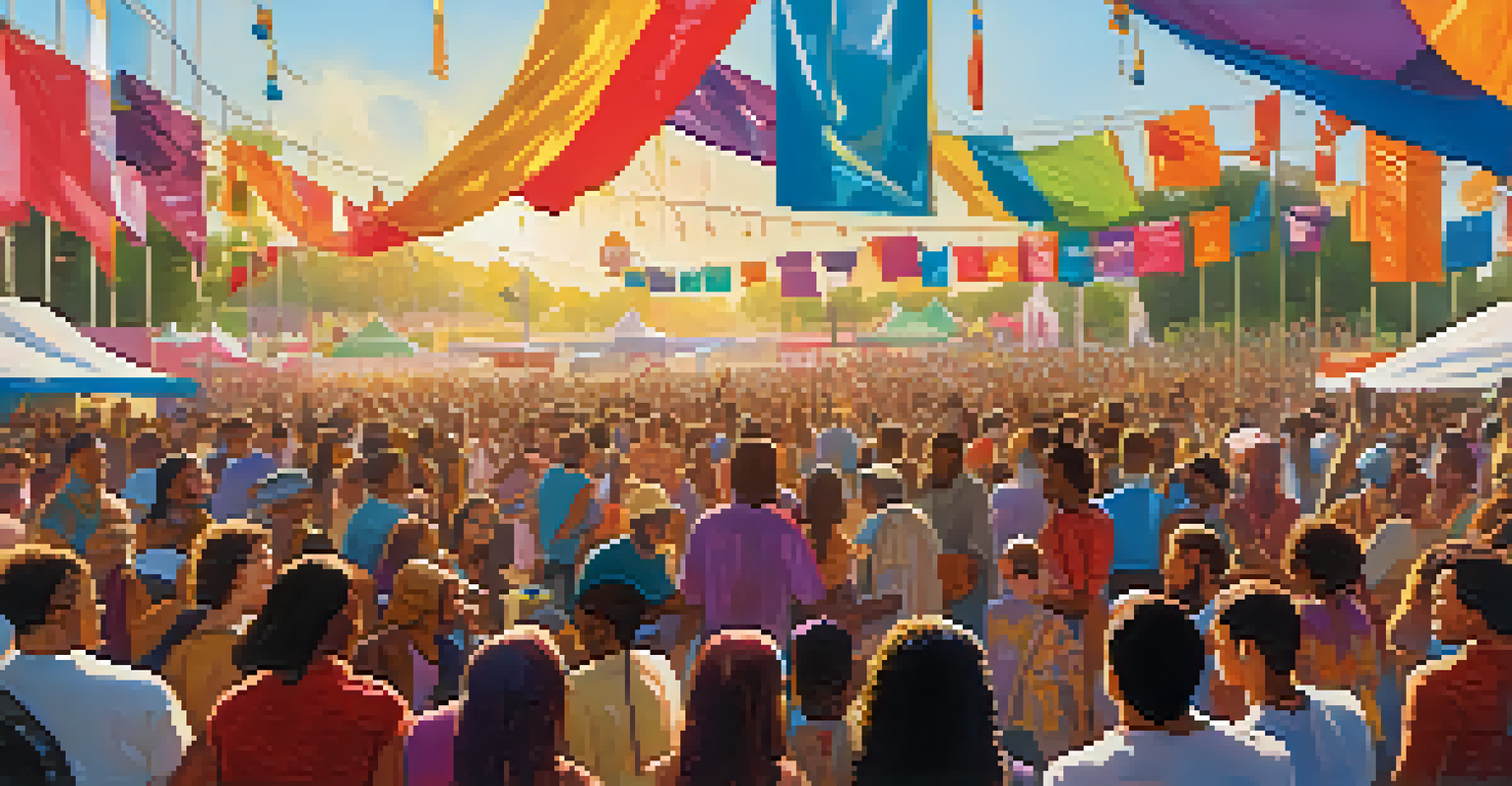Examining Cultural Appropriation in Music Lyrics: A Deep Dive

Understanding Cultural Appropriation in Music
Cultural appropriation occurs when elements of one culture are taken and used by another, often without permission or understanding. In music, this can manifest through borrowing styles, instruments, or lyrical themes from different cultures. This practice can lead to a complex mix of appreciation and exploitation, raising questions about ownership and respect.
Cultural appropriation is often seen as a form of exploitation, where the dominant culture takes the elements of a marginalized culture without permission or understanding.
For example, when a pop artist adopts traditional music styles from a marginalized culture, they might gain commercial success. However, this can leave the original artists feeling overlooked and disrespected, as their cultural significance is diluted. Understanding this dynamic is crucial as we navigate the diverse landscape of modern music.
As listeners, it's essential to recognize the origins of the sounds we enjoy. By acknowledging the cultural roots of music, we can foster a more respectful appreciation for the artists and traditions that shape our favorite songs.
Historical Context of Cultural Exchange in Music
Throughout history, music has always been a melting pot of influences, with artists borrowing from various traditions. This exchange can be viewed positively, as it promotes creativity and innovation. However, historical power imbalances complicate this narrative, especially when dominant cultures appropriate elements from marginalized ones.

Take rock and roll, for instance, which heavily draws from African American blues. While it paved the way for new genres, many black artists were overshadowed by their white counterparts, leading to a conversation about who truly benefits from cultural exchange. Understanding this history is vital for appreciating the nuances of contemporary music.
Cultural Appropriation Defined
Cultural appropriation in music occurs when artists borrow elements from other cultures without understanding or respecting their significance.
This rich tapestry of influences reminds us that music is not created in a vacuum. By examining the historical context, we can better appreciate the artists who contribute to these genres and the struggles they face in gaining recognition.
Examples of Cultural Appropriation in Popular Music
There are several high-profile examples of cultural appropriation in music that have sparked debate. For instance, artists like Miley Cyrus and Katy Perry have faced criticism for adopting aspects of hip-hop culture in their work while not fully understanding its roots. Such instances highlight the thin line between appreciation and appropriation.
Music is a world within itself, it’s a language we all understand. But when we don’t respect its roots, we risk losing its true essence.
Another example is the use of Native American imagery in pop songs, which often strips away the cultural significance and reduces it to mere aesthetic. This not only disrespects the culture but also perpetuates stereotypes, leading to a broader conversation about representation in media.
These examples serve as a reminder that while music can unite us, it can also divide us if not approached with sensitivity. By examining these cases, we can learn to navigate our musical landscape with greater awareness and respect.
The Role of Social Media in Cultural Discussions
In today's digital age, social media plays a crucial role in shaping conversations around cultural appropriation in music. Platforms like Twitter and Instagram allow fans to express their opinions and hold artists accountable for their choices. This immediate feedback loop has made discussions more accessible and widespread.
For instance, when a popular artist is called out for cultural appropriation, it often trends on social media, prompting broader discussions about ethics in music. These conversations can lead to greater awareness and encourage artists to reflect on their influences more critically.
Historical Context Matters
The history of musical influences highlights the complexities of cultural exchange, emphasizing the need to recognize the contributions of marginalized artists.
However, social media can also lead to polarization, where nuanced conversations get lost in outrage. It’s essential for both artists and fans to engage thoughtfully, considering multiple perspectives to foster a deeper understanding of cultural dynamics.
Artist Responsibilities in Cultural Representation
Artists hold a significant responsibility when representing cultures in their music. They must navigate the fine line between inspiration and appropriation, ensuring they approach cultural elements with respect and sincerity. This includes understanding the origins of the styles they borrow and giving credit where it’s due.
For example, artists like Bruno Mars have faced scrutiny for their blending of various cultural influences in his music. While his work celebrates diversity, it also raises questions about authenticity and acknowledgment of the cultures he draws from. Artists can mitigate backlash by being transparent about their influences and showing appreciation for the original artists.
Ultimately, when artists take the time to educate themselves and engage with the cultures they represent, they contribute to a more respectful and inclusive music industry. This not only enriches their art but also fosters community and understanding.
The Impact of Cultural Appropriation on Audiences
Cultural appropriation in music can significantly impact audiences, influencing how they perceive and engage with different cultures. For many listeners, music is a gateway to understanding diverse narratives and traditions. However, when artists appropriate without context, it can perpetuate harmful stereotypes and misunderstandings.
For instance, fans of an artist who appropriates a culture may unknowingly adopt attitudes or behaviors that devalue the original culture. This can create a cycle of misunderstanding and disrespect, reinforcing the very issues of cultural erasure and exploitation that appropriation brings to light.
Audience Impact and Responsibility
Cultural appropriation can shape audience perceptions, making it crucial for listeners to support artists who honor their cultural influences.
Being mindful of the implications of cultural appropriation encourages audiences to seek out authentic representations. By supporting artists who honor their influences, fans can contribute to a more equitable and respectful music landscape.
Moving Toward a More Respectful Music Landscape
As we navigate the complex interplay of culture and music, it's essential to advocate for a more respectful landscape. This begins with educating ourselves about the cultures represented in the music we consume. By understanding the context and significance of different musical elements, we can appreciate them more deeply.
Additionally, supporting artists who actively engage with and respect the cultures they draw from can create positive change in the music industry. This might include attending live performances, purchasing music directly from artists, or sharing their work on social media to amplify their voices.

Ultimately, fostering respect and appreciation for diverse cultures in music requires collective effort. By encouraging dialogue and understanding, we can build a richer musical environment where all voices are valued and honored.